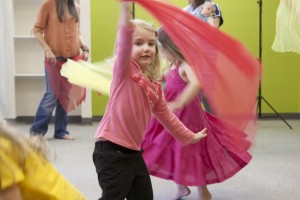Parents have lots of options when it comes to activities for their children. How’s a parent to choose between Baby Yoga and Toddler Soccer and Mommy & Me Cooking Classes – not to mention those other music-like programs? As a Musikgarten studio owner, it’s important to know what to say to a parent who is thinking about signing up for Musikgarten, but isn’t totally sold…yet.
So with that in mind, we’ve researched and compiled a list of 11 important ways children benefit from music education. Use this sound reasoning to help parents make the smart decision!
- It’s highly logical: music improves reasoning skills! Children who take music lessons are shown to have unique brain functions compared to children who do not receive music lessons. In general, children with music instruction tend to score higher in memory, reasoning and in writing, math, and science. Source: PBS.org
- All together now: music teaches coordination! Playing instruments and learning rhythmic movement develops dexterity and coordination between the ear, brain, and body. Enhanced coordination, fine, and gross motor skills can open a world of possibilities, not only in the arts, but in sports as well. Source: Parents.com
- Excuse me ma’am, music cultivates social skills! Music classes require interaction with both adults and peers, and classes help teach respect, direction following, impulse control, teamwork and “musical sportsmanship” – that is encouraging and supporting each other. Through music, a child learns how to respect others and collaborate within a group to accomplish a goal. Source: Parents.com
- From the top! Music teaches children to practice. While practice may not always make perfect, music teaches children how to practice and why it matters. Whether they’re learning to play an instrument or simply learning about music, the act of practicing teaches children about self-discipline, patience, perseverance, resilience, and how to reach both short- and longer-term goals. Source: Violinist.com
- Music boosts confidence and self-esteem! Learning about music and how to play an instrument takes work but the rewards are incredibly gratifying. A child’s confidence can be immediately boosted through understanding, reading, and performing. Even small achievements will boost a child’s self-esteem.
- Music is like “IQ food”! Studies show that children who were given music lessons over a year averaged three IQ points higher than other groups. And because music requires the use of both the right and left sides of the brain, it helps create new neural pathways and linkages that help improve overall brain function. Source: beautythroughimperfection.com
- Music teachers are many! We don’t have to tell you that music teachers are something really special! But when it comes to music, children also benefit from a whole world of mentors – from classical composers to popular musicians to experimental sound artists. Whatever a child’s preferences, there will always be an endless catalog of music and musicians available to inspire and teach them something new.
- Don’t forget! Music fosters short- and long-term memory! Each of us can still remember the first song we were asked to memorize as youngsters, or even the 16 bars we practiced for hours upon hours. Learning music stimulates the hippocampus in the brain, which in turn supports short- and long-term memory. Source: Psychologytoday.com
- Wait, what? Music can increase attentiveness and focus! The ability to pay attention—focus, listening, and staying on task—is deeply connected to academic performance. A research team at Stanford University found that music engages the areas of the brain involved with paying attention and focus, which can directly contribute to higher test scores in school. Source: med.stanford.edu; Oxford Journal
- ¡Fantastico! Music helps children learn other languages. Music training has been shown to physically develop that portion of the brain responsible for language development. A more developed language center allows for the mastery of a native language as well as foreign languages. Source: PBS.org
- Music is a trip! Because Musikgarten incorporates curricula, lessons and songs from other countries, children will learn about other cultures. Musikgarten won’t just open their minds; it’ll open up their worlds! With our uniquely global approach, children become curious about other cultures and may be inspired to follow an educational or career path that takes them to new and exciting places.
You know music matters, now you can help parents understand why music – and Musikgarten – are so much more important that they realize!







